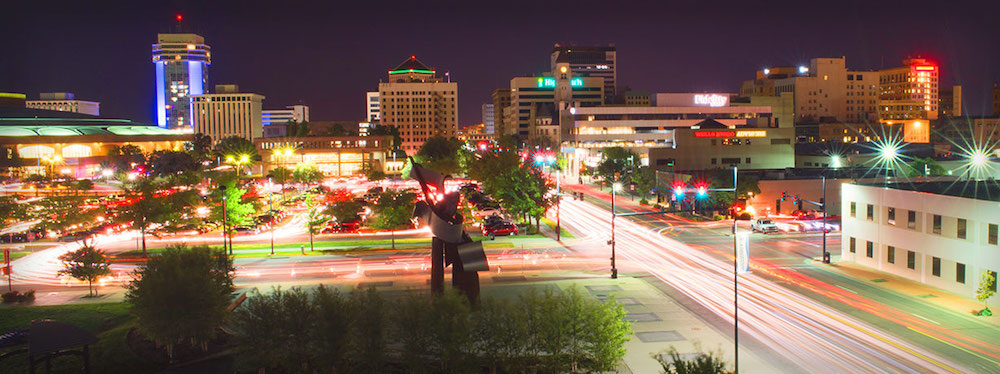
Yearning for a place where you can spend more time lounging in your backyard and less time fighting traffic? Wichita, KS, might be the spot for you.
A LawnStarter analysis of data from the U.S. Census Bureau’s American Community Survey for 2015 indicates commuters in the Wichita metro area are the least stressed among the country’s largest metro areas. Census Bureau data was not available for six of the 100 most populous metro areas: Allentown, PA; Augusta, GA; Deltona-Daytona Beach-Ormond Beach, FL; Jackson, MS; Lakeland-Winter Haven, FL; and Palm Bay-Melbourne-Titusville, FL.
No Rush Hour
Ken Kriz, a professor of public finance at Wichita State University, says his daily commute from his home in far southeast Wichita to the university campus in northeast Wichita takes about 22 to 23 minutes — and that’s considered a long commute by Wichita standards. Kriz says Wichita really doesn’t experience rush-hour traffic, unlike metros such as New York City, NY, and Los Angeles, CA.
“That kind of traffic doesn’t exist here,” Kriz says.
In fact, the traffic is so light in Wichita that commuting problems typically pop up only when bad weather hits, Kriz says.
Ken Kriz is a professor of public finance at Wichita State University.
Photo: Wichita State University
Ranking Factors
To compile our ranking, we looked at the percentage of workers age 16 and above in each metro area with daily commutes of 60 minutes or more and the percentage of workers with daily commutes of 10 minutes or less. We weighted each of those factors evenly to arrive at our final rankings.
Wichita fared well in both categories, with a mere 2.68 percent of workers reporting commutes of 60 minutes or more in 2015 and a healthy 16.28 percent of workers reporting commutes of 10 minutes or less.
Wichita did not lead either of those categories, however. In our top 12, the Omaha, NE, metro area had the lowest percentage of workers with commutes of 60 minutes or more (2.51 percent) and the Provo-Orem, UT, metro area had the highest percentage of workers with commutes of 10 minutes or less (20.82 percent).
The Wichita, KS, metro area has a little over 640,000 residents.
Photo: Flickr/Wichita Chamber of Commerce
Wichita’s Traffic Attributes
One consideration favoring Wichita’s low-stress commute is the region’s relatively small population. In 2015, the five-county metro area had well under 1 million residents — 644,610, to be precise. Obviously, that translates into fewer cars on the roads and, therefore, less traffic than bigger metro areas.
Additionally, Wichita is a pretty compact area. The city of Wichita covers almost 160 square miles. By comparison, Oklahoma City, OK, encompasses a little over 600 square miles, with Kansas City, MO, measuring nearly 314 square miles. On top of that, Wichita has far fewer suburbs than larger metro areas such as Kansas City, MO, and Minneapolis-St. Paul, MN, meaning there’s less traffic being funneled from nearby communities.
Perhaps an even bigger factor is that many of Wichita’s big employers aren’t heavily concentrated in a central business district. Instead, they’re located in “nodes” throughout the city, says Kriz, the Wichita State professor. For instance, key players in one of Wichita’s biggest industries — aircraft manufacturing — are spread throughout the city.
‘Great Benefit’
Whatever the reason for the low-stress commute in Wichita, Courtney Sendall is grateful. Every workday, Sendall drives 12 minutes each way between her home in east Wichita and the offices of the Wichita Metro Chamber of Commerce in downtown Wichita.
“Spending less time getting to and from my job is a great benefit of living in Wichita. A shorter commute leaves more time for family and friends, volunteering or other extracurricular activities,” says Sendall, the chamber’s communications manager. “I often take for granted the ease of moving around my city until I travel, when Wichita’s short drive times become even more apparent.”
Long commutes can decrease satisfaction with life, researchers say.
Photo: Flickr/Johnn
‘Time Crunch’
In places where people would envy the short Wichita commute, what’s apparent is the unhappiness triggered by so much time spent getting to and from work.
A study released in 2014 concluded that workers with the longest commutes have the lowest overall satisfaction with their lives. The study was published in World Leisure Journal.
“Some people may enjoy a commute, but overall, longer travel time is linked to feelings of time crunch, which can increase stress levels,” says study co-author Margo Hilbrecht, associate director of research for the Canadian Index of Wellbeing.
The study showed that the life satisfaction of commuters is tied to exercise and other physical activity.
“We learned that commuters who had time for physical leisure had higher life satisfaction,” Hilbrecht says. “Physical activity can mitigate commuting-related stress if workers can include it in their daily routines, but the obvious constraint is time scarcity. Longer commutes mean less time for other activities, which leads to lower life satisfaction.”
12 Metro Areas With the Least-Stressed Commuters
Here’s our the ranking of the 12 Metro Areas With the Least-Stressed Commuters — metro areas where commuters probably are pretty satisfied with their lives.
1. Wichita, KS
Photo: Wichita Crime Commission
Percentage of workers with commutes of 60 minutes or more: 2.68%
Percentage of workers with commutes of 10 minutes or less: 16.28%
2. Des Moines, IA
Photo: Flickr/Phil Roeder
Percentage of workers with commutes of 60 minutes or more: 2.95%
Percentage of workers with commutes of 10 minutes or less: 15.19%
3. Madison, WI
Photo: Flickr/Ron Cogswell
Percentage of workers with commutes of 60 minutes or more: 3.64%
Percentage of workers with commutes of 10 minutes or less: 15.81%
4. Toledo, OH
Photo: Junior Achievement of Northwestern Ohio
Percentage of workers with commutes of 60 minutes or more: 4.01%
Percentage of workers with commutes of 10 minutes or less: 16.39%
5. Dayton, OH
Photo: Extreme’s One Hour Heating & Air Conditioning
Percentage of workers with commutes of 60 minutes or more: 4.12%
Percentage of workers with commutes of 10 minutes or less: 15.65%
6. Omaha, NE
Photo: Federal Reserve Bank of Kansas City
Percentage of workers with commutes of 60 minutes or more: 2.51%
Percentage of workers with commutes of 10 minutes or less: 13.97%
7. Boise, ID
Photo: Shadow Built Homes
Percentage of workers with commutes of 60 minutes or more: 2.96%
Percentage of workers with commutes of 10 minutes or less: 14.20%
8. Rochester, NY
Photo: Flickr/Ryan Hyde
Percentage of workers with commutes of 60 minutes or more: 4.04%
Percentage of workers with commutes of 10 minutes or less: 15.15%
9. Provo-Orem, UT
Photo: City of Provo
Percentage of workers with commutes of 60 minutes or more: 5.15%
Percentage of workers with commutes of 10 minutes or less: 20.82%
10. Spokane, WA
Photo: City of Spokane
Percentage of workers with commutes of 60 minutes or more: 4.27%
Percentage of workers with commutes of 10 minutes or less: 15.39%
11. Youngstown, OH

Photo: Youngstown-Warren Regional Airport
Percentage of workers with commutes of 60 minutes or more: 5.27%
Percentage of workers with commutes of 10 minutes or less: 19.20%
12. Tulsa, OK
Photo: Tulsa Association of Petroleum Landmen
Percentage of workers with commutes of 60 minutes or more: 3.40%
Percentage of workers with commutes of 10 minutes or less: 14.21%
Top photo: Young Professionals of Wichita
LawnStarter allows you to easily book, manage and pay for lawn care service online so that you have one less thing to worry about. Book a local lawn care pro near you today.




















